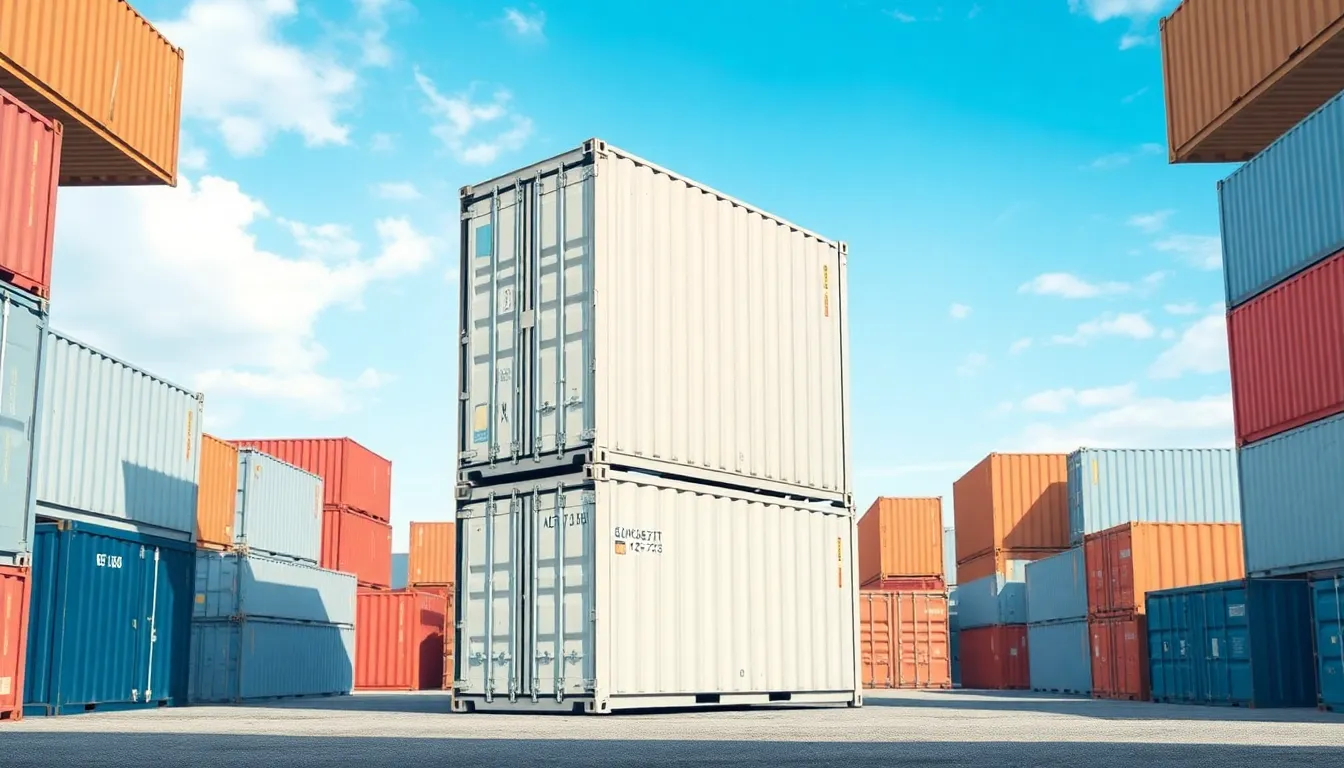In a world where space is at a premium, commercial storage containers have emerged as the unsung heroes of organization. Picture this: a sturdy steel box that can hold everything from excess inventory to seasonal decorations, all while keeping your business running smoothly. These containers are like the Swiss Army knives of storage—versatile, reliable, and surprisingly stylish.
But let’s face it, who doesn’t love a good storage solution that doesn’t require a degree in Tetris? With commercial storage containers, businesses can declutter, streamline operations, and maybe even find that long-lost stapler. Whether you’re a small startup or a large corporation, these containers offer a practical solution to your storage woes, proving that sometimes the best ideas come in a box.
Table of Contents
ToggleOverview of Commercial Storage Containers
Commercial storage containers provide robust solutions for businesses facing spatial constraints. These containers, often made of steel or durable materials, come in various sizes, typically ranging from 10 to 40 feet in length. Their construction ensures they withstand diverse weather conditions, offering reliable protection for stored items.
Versatility stands out as a key feature of commercial storage containers. Businesses can utilize them for on-site storage, shipping goods, or even as temporary office spaces. They easily adapt to numerous applications, making them suitable for sectors such as retail, construction, and warehousing.
Cost-effectiveness further enhances their appeal. Companies often find renting or purchasing these containers a budget-friendly alternative compared to building additional storage space. With low maintenance requirements, they reduce ongoing operational costs, allowing businesses to allocate resources more efficiently.
Aesthetic appeal also plays a role in their popularity. Many manufacturers offer customization options, allowing businesses to tailor the color and branding of their containers to align with corporate identities. This aspect ensures that containers not only serve functional purposes but also contribute positively to the overall business image.
Moreover, security features such as lockable doors and reinforced construction provide peace of mind. Businesses can store valuable items without the worry of theft or damage.
Overall, commercial storage containers stand out as essential organizational tools, enabling businesses to manage their storage challenges effectively while maximizing efficiency and minimizing costs.
Benefits of Commercial Storage Containers

Commercial storage containers offer numerous advantages that enhance operational efficiency and organizational capabilities for businesses. Their robust design and versatility make them a valuable asset in various sectors.
Space Efficiency
Space efficiency ranks high among the benefits of commercial storage containers. They maximize available space, fitting into tighter areas where conventional storage solutions may not. Containers come in multiple sizes—10 to 40 feet—allowing businesses to select an option that meets their specific storage needs. Businesses can stack containers or utilize them for vertical storage, optimizing site layouts. They also meet demands for scalable storage; businesses can add or remove containers as requirements shift. By decluttering work environments, these containers streamline operations and foster productivity.
Cost-Effectiveness
Cost-effectiveness emerges as a significant draw for businesses considering commercial storage containers. Purchasing or renting containers generally incurs lower costs than constructing additional storage facilities. Initial investment in containers is often recouped quickly through reduced overhead and maintenance expenses. Containers also help avoid costly disruptions associated with building projects, allowing businesses to allocate resources elsewhere. Flexible rental agreements permit businesses to choose terms that align with their needs, making these solutions financially attractive. Overall, commercial storage containers serve as a smart investment for enhancing operational efficiency while managing budget constraints.
Types of Commercial Storage Containers
Commercial storage containers come in several types, each designed to meet specific storage and organizational needs.
Shipping Containers
Shipping containers frequently serve businesses requiring robust and secure storage solutions. Constructed from high-strength steel, these containers provide weather resistance and durability. Standard lengths include 20 feet and 40 feet, accommodating various storage volumes. Shipping containers are ideal for transporting goods, making them suitable for logistics and supply chain operations. Additionally, their modular nature allows easy stacking, enhancing space efficiency on-site. Many businesses customize shipping containers with shelving, lighting, and ventilation for added functionality.
Portable Storage Units
Portable storage units offer businesses flexibility and convenience, functioning as temporary storage solutions. Often rented or leased, these units range from 8 feet to 16 feet in length, making them suitable for diverse applications. Companies use portable units for on-site organization during renovations or events, providing instant access to materials and tools. Constructed with weather-resistant materials, these units protect items from environmental damage. Furthermore, businesses can relocate portable storage units without hassle, adapting to changing needs quickly.
Applications of Commercial Storage Containers
Commercial storage containers serve multiple applications across various sectors, enhancing efficiency and organization. Their robust design makes them adaptable for numerous storage needs.
Construction Sites
Construction sites benefit significantly from commercial storage containers. They provide secure storage for tools, equipment, and materials, protecting them from theft and weather-related damage. Containers facilitate on-site organization, allowing workers easy access to essential items, reducing time spent searching for tools. Their mobility enables relocation as construction phases change, ensuring materials remain on-site when needed. Additionally, containers can function as temporary offices or break rooms, promoting a functional workspace.
Retail and Inventory Management
In retail and inventory management, commercial storage containers streamline operations. They offer efficient stock management by providing additional space for excess inventory during peak seasons. Containers enable retailers to consolidate products, optimizing floor space and enhancing customer experience. Their secure nature prevents loss, ensuring products remain intact until needed. Moreover, some containers can be customized with branding to enhance visibility and aesthetics, further integrating them into the retail environment.
Choosing the Right Commercial Storage Container
Selecting the appropriate commercial storage container requires assessing various factors. Container size plays a crucial role, as businesses often choose dimensions based on specific storage requirements. Common sizes include 10, 20, and 40 feet, with larger units serving more extensive inventory needs.
Material quality becomes essential. Containers crafted from high-strength steel offer durability and security, ideal for protecting valuable assets. Waterproof and rust-resistant coatings further enhance longevity, especially in outdoor environments.
Intended use impacts the selection process. For on-site storage, portable storage units facilitate easy relocation, accommodating temporary situations like renovations or events. Shipping containers, on the other hand, fit logistics and supply chain operations, providing a mobile solution that maintains security during transport.
Customization options also influence choices. Many containers allow for interior modifications, such as shelving and ventilation, catering to specific needs. Branding opportunities exist, enabling businesses to feature logos or colors, which enhances visibility and professionalism.
Budget considerations are significant when choosing containers. Renting often provides a cost-effective alternative to purchasing, especially for short-term needs. Organizations can evaluate various pricing models, including flat fees or monthly rentals, aligning with financial strategies.
For businesses adopting eco-friendly practices, purchasing refurbished containers presents a sustainable option. Reusing existing materials reduces environmental impact while maintaining quality.
Understanding these factors ensures optimal selection of commercial storage containers, impacting organizational efficiency and cost management. By focusing on specific requirements, businesses can enhance overall performance through informed container choices.
Commercial storage containers offer businesses a practical solution to various storage challenges. Their versatility and robust construction make them ideal for different sectors, enhancing organizational efficiency and maximizing available space.
By choosing the right container, businesses can effectively manage inventory, tools, and materials while maintaining a streamlined operation. The cost-effectiveness of these containers further supports financial flexibility, allowing companies to focus on growth and productivity.
With customization options available, commercial storage containers not only meet functional needs but also align with branding strategies. As businesses continue to navigate space constraints, these containers prove to be indispensable assets in achieving optimal organization and efficiency.




